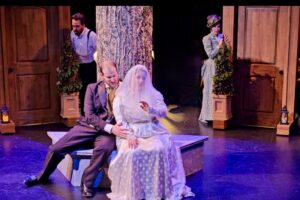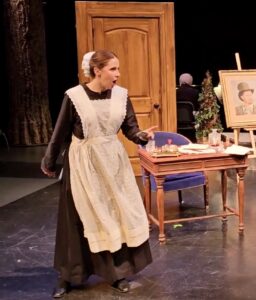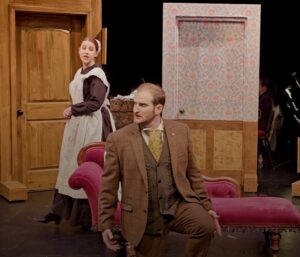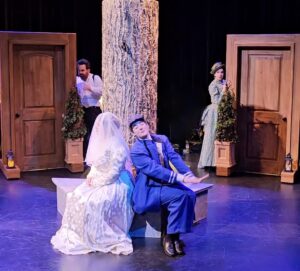The Marriage of Figaro
Wolfgang Amadeus Mozart, Composer; Lorenzo do Ponte, Original Italian Libretto
Donald Pippin, English Version
Pocket Opera

Since its Vienna premiere in 1786, perhaps there is no better-loved, globally popular opera than Wolfgang Amadeus Mozart’s The Marriage of Figaro, an operatic comedy with laugh-out-loud mix-ups and shenanigans; universal lessons about love, fidelity, compassion, and forgiveness; and some of the most glorious music ever written. Performed often in the grandest of opera houses worldwide with casts large and much-celebrated, Bay Area audiences now have the rare and special opportunity to experience Figaro up-close in an intimate setting with a cast stunningly superb in their vocal and comedic performances, a chamber-size orchestra gorgeously rendering the famous score, and an English version libretto packed with punch and pun and easily accessible to all. In every respect imaginable, Pocket Opera triumphantly succeeds in presenting Donald Pippin’s English adaptation of Lorenzo do Ponte’s original Italian libretto for a production of Mozart’s The Marriage of Figaro that deservedly warrants nothing but sold-out audiences (as was the case its opening night at Mountain View’s Center for the Performing Arts).
Under the splendidly creative and insightful stage direction of Sergey Khalikulov, Pocket Opera’s Figaro is a delicious romp of upstairs/downstairs love triangles, plots of silly revenge, and numerous switched identities with only happy endings guaranteed — all in all, sporting touches of Shakespeare, Marx Brothers, and I Love Lucy. The hilarity blossoms into much more than just a lot of laughs as there are universal lessons to be imparted about trust, patience, mercy, and pardon in love relationships. And through the sublime interpretation and direction of Marika Yasuda’s musical direction of the principals and the eleven-piece orchestra, the mastery of Mozart’s miraculous score shines forth, insuring Pocket Opera’s The Marriage of Figaro is above all an evening of musical magic.

With the Pocket production set in the height of New York City’s Gilded Age of the 1880s when new wealth threatened to shove aside old money and its traditions and rules, this Figaro opens as Figaro — the personal valet of USA-newcomer and recently rich Count Almaviva — and Susanna — favored maid of young and beautiful Countess Almaviva — are about to be married. However, in this single “day of madness” created for them by Mozart, the Count plans to exercise a traditional right he has brought from the Old Country to be the first to bed the servant-girl bride — a plan his wife and the bride plan to abort through clever manipulations of their identities.
However, to further complicate matters (and add to both the humor and the surprise elements of the crazy day), a somewhat elderly Marcellina arrives with her revenge-seeking lawyer, Bartolo (both characters from Figaro’s prequel, The Barber of Seville). Marcellina announces that an old debt that she has with Figaro means that if he cannot pay immediately what is owed her, she has legal claim to be his bride … and she has a judge ready to rule in her favor.
In the meantime, a page to the Count, Cherubino — hyped up with the raging hormones of youth — brazenly and foolishly seeks romantic favors with both the Countess and Susanna. Who will marry whom, who will break up with whom, and who will find themselves in the biggest of hot water situations is just some of the fun to ensue over the evening’s highly enjoyable two hours, thirty minutes (plus intermission).
With several individual and Chorus roles under his belt with the San Francisco Opera, Andrew Thomas Pardini rings forth with his resoundingly deep and rich baritone in the title role of Figaro. Blending excellence of vocal and acting abilities, his Figaro is at one moment in puppy dog love with his bride-to-be and in the next, suddenly full of false accusations of her infidelity, spouting to us as audience near day’s end an aria about the inconsistency of women. With eyes that vividly express their own libretto and with a chameleon-like range of moods and manners, Pardini’s Figaro is both funny and infuriating; but in the end, he is truly endearing and always vocally impressive.
As his intended, Morgan Balfour brings instantaneous boldness and brains to the role of Susanna as the servant finds herself in compromising situations not of her doing and still figures out ways to save herself and others from embarrassment. Whether sitting on a hiding Cherubino to protect them from a suspicious Count or slithering on the floor herself to hide from the master, her Susanna exudes much comedic flair with facial expressions that speak volumes. But more importantly, Morgan Balfour sings with a soprano voice beautifully lyrical that both heavenly floats as well as intones deep substance. Her Act IV aria of expressed love under a “moon [that] is hid” and stars [that] blow our their candles” is particularly splendid and memorable.

With incredible intensity that permeates his entire being and is heard in a voice that cuts through the air with baritone brilliance, Spencer Dodd commands the stage each time his Count Almaviva appears. Notes reverberate with sought vengeance when he believes himself cuckolded or when he foolishly sings with biting bitterness “Murder, murder” to a wife who smirks at his rash, unjustified conclusions of her infidelity. Time and again, his Count is the fool on the stage without ever realizing it — one who is fooled by being outwitted by the intelligence and courage of the women around him. When at last the Count begs with pleading notes for his wife’s forgiveness, Spencer Dodd brings to a close a capstone performance.
If there is a star among stars in this Figaro, then surely that honor goes to Julia Mulholland for her many moving moments of sheer, soprano beauty in the role of the Countess. Purity and clarity of tone enrich her recitatives and arias time and again, with notes flowing in emotion as both despair and hope are expressed in terms of her relationship with a philandering yet overly jealous husband. At the same time, her Countess is delightful to watch as she playfully but purposefully plots with Susanna how the two can teach their men needed lessons to transform them into the loyal and trusting husbands they rightfully deserve.

But wait, not to be outdone in deserved notice is a performance that comes close to stealing the show on more than one occasion. In a gender-bending role that reveals through a hidden ribbon a surprise that probably Mozart could never have imagined — just one of many directorial sparks ignited throughout the evening — Nina Jones is a Cherubino who pops into scenes with electric energy and devilish spunk. Singing with a voice that combines pleasing lightness with just enough tremble to underline notes for full effect, their Cherubino holds their own musically while also being hysterical. There is both the excitement and naiveté of youth as well as a raving desire to kiss almost any available female that makes Nina Jones and Cherubino hilarious fun to watch their next move of pursuit.
Rounding out this magnificent collection of actors/singers are yet more singularly excellent roles. Deborah Rosengaus rolls her R’s for fiery effect as her deep and powerful soprano voice reigns supreme in the role of Marcellina, a woman out to steal Figaro for her own, only to be awarded the surprise of her life and a possession of him not at all expected. Michael Grammer’s baritone trumpets deep and powerful in Bartolo’s much sought revenge against Figaro; but his Bartolo also has a shock coming that at first, he can hardly fathom accepting as true but one that leads him straight to the altar.
With full-sounding vocals and spirited sweetness of character, Syona Ayyankeril’s Barbarina cries out her fright in losing the Count’s special message to his wife in the form of a sharp pin while later she convinces the Count that she deserves the hand of flirty Cherubino. Joachim Luis markedly employs his tenor vocals to embody with flair the gossipy, busybody Basilio as well as to arrive in masked hilarity as the ditsy Judge Curzio ready to condemn Figaro to Marcellina for life.
A regular to Pocket Opera, Chris Pilcher fills his few moments on stage as the gardener Antonio with sparkling antics and with his much-loved mellow and deep bass/baritone. And finally, Ash Hurtado and Alyssa Vieau are household staff who hold forth themselves well when called upon to sing lines quite melodious.
In a space quite small and within feet of the first row of audience, Daniel Yelen wonderfully creates scenes populated by rotating doors that become much of the open/shut, hide-and-seek humor of the production along with properties including many portraits of the Count and Countess that are often characters of their own right in the evening’s fun. Robert Horek’s costumes make a major contribution in accurately establishing the era as well as the societal positions of each character.
With unfortunately only two more Pocket Opera performances on tap for this must-see Figaro, potential audience members should quickly secure a seat in order to experience Mozart’s supreme masterpiece with an intimacy rarely possible and with an excellence of production to be envied by any opera company, any where.
Rating: 5 E, MUST-SEE
The Marriage of Figaro continues February 23 at Hillside Club in Berkeley and March 2, 2025, at the Legion of Honor in San Francisco in a two-hour, thirty-minute (plus intermission) production by Pocket Opera. Tickets are available at http://pocketopera.org.
Photo Credits: Courtesy of Pocket Opera

Leave a Reply